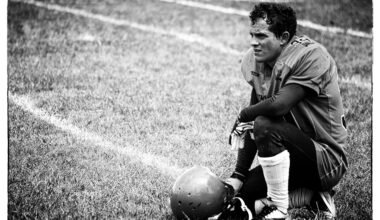Recovery Supplements: What OCR Athletes Should Know
When it comes to obstacle course racing, recovery is a significant part of an athlete’s training regimen. Recovery supplements play a crucial role in helping OCR (Obstacle Course Racing) athletes bounce back from exhaustive workouts and competitions. These supplements aid in muscle repair, reduce soreness, and replenish essential nutrients lost during strenuous physical activities. Understanding the types of available supplements is vital for any serious athlete, as the right choices can enhance performance and overall health. Some of the most common recovery supplements include protein powders, BCAAs (branched-chain amino acids), and electrolyte drinks. These products aim to facilitate recovery over time and help athletes maintain their training intensity. Moreover, the market is saturated with various options, making it necessary for athletes to do thorough research before selecting a product. Incorporating these recovery supplements can optimize results and speed up the healing process. Using quality recovery products can also help in preventing injuries associated with training while ensuring that athletes are physically prepared for their next challenges.
The Importance of Protein for Recovery
Protein is fundamental for muscle repair and growth, particularly after intense workouts. For OCR athletes, consuming enough protein is essential to promote recovery and muscle adaptation. Studies suggest that consuming protein shortly after exercising can significantly accelerate recovery, minimising muscle soreness. This nutrient helps rebuild muscle fibers that get damaged during training sessions. Athletes often look towards protein supplements, such as whey and plant-based powders, for a quick source of protein post-workout. The timing of protein ingestion matters; ideally, athletes should aim to consume protein within a 30 to 60-minute window after finishing a workout session. This immediate post-exercise period is often referred to as the ‘anabolic window’ and offers a significant opportunity to boost recovery. A protein intake of around 20-30 grams per serving is recommended for optimal muscle recovery benefits. Moreover, considering the source of protein is important; high-quality sources that contain a complete amino acid profile are preferred. Incorporating protein into a balanced diet allows OCR athletes to perform and recover effectively between training sessions.
Alongside protein, BCAAs are well-known supplements that offer significant recovery benefits. Branched-chain amino acids consist of three essential amino acids, namely leucine, isoleucine, and valine. These amino acids play a crucial role in stimulating muscle protein synthesis. They can help in reducing muscle breakdown, which can occur due to rigorous races and workouts. For OCR athletes, incorporating BCAAs into their daily regimen can enhance muscle recovery and play a role in preventing fatigue. Many athletes prefer to ingest BCAAs before or during workouts to get maximum benefits. Studies indicate that BCAAs can help reduce delayed onset muscle soreness (DOMS) which can hinder training. Due to their quick absorption, BCAAs are excellent for immediate energy during training sessions. Interestingly, these supplements can also improve endurance and prevent mental fatigue, making them an excellent choice for long training sessions. Additionally, BCAAs can assist with maintaining muscle mass when combined with a low-calorie diet during weight management phases. Athletes should consult with nutrition professionals to determine the appropriate dosage.
Electrolytes and Their Role in Recovery
Electrolyte supplements are another essential part of recovery for OCR athletes. During intense physical activities, such as obstacle racing, the body loses electrolytes through sweat. These minerals, including sodium, potassium, magnesium, and calcium, are vital for maintaining fluid balance, muscle function, and overall health. Dehydration can severely impact performance, leading to cramps and fatigue, making it crucial to replenish these lost electrolytes post-workout. Many athletes choose to consume electrolyte drinks or powders immediately following their exercise. These products are designed to rehydrate and restore electrolyte levels quickly. Moreover, consuming electrolyte supplements can also enhance recovery by improving hydration status, which is essential for optimal muscle function and recovery. Studies suggest that electrolyte balance plays a significant role in reducing fatigue and promoting better overall performance. Simply drinking water isn’t always enough; electrolytes need to be replaced as well. Athletes should ensure they choose products that have balanced formulations to prevent imbalances that could hinder their performance and recovery. Evaluating personal needs and preferences is a key aspect of effective recovery strategies.
When selecting recovery supplements, it is paramount for athletes to consider the quality of the products they choose. The supplement industry is broad and not all products are created equal. Some may contain fillers, artificial sweeteners, and low-quality ingredients that could impact health negatively. Athletes should look for supplements that are third-party tested or have received certifications from reliable organizations. Transparent brands that disclose all ingredients and provide detailed nutritional information are preferable. Reading customer reviews can also provide insights into the effectiveness of a particular supplement. Individuals need to tailor their supplement selections based on their unique needs, goals, and preferences. Consulting with a healthcare provider or a sports nutritionist can offer personalized recommendations. It’s also essential to remember that supplements are not a substitute for a balanced diet. Rather, they should complement an athlete’s nutritional intake for optimal performance. A diverse intake of whole foods and nutrient-dense meals can provide a solid foundation for recovery. Personal experimentation may also assist in identifying which supplements best support recovery and athletic performance.
Supplement Timing and Integration
The timing of recovery supplements also plays a pivotal role in their effectiveness. Many athletes focus solely on what supplements to take, often neglecting when they should consume them. Nutrition timing can significantly impact recovery outcomes. Following intense training sessions or competition, immediate post-exercise fuel becomes critical. This is the moment when muscles best absorb nutrients needed for repair. OCR athletes should strive to intake their recovery supplements within the first hour after exercise, as this is when the anabolic window is open. This can facilitate muscle recovery and enhance glycogen replenishment. On the other hand, pre-workout supplementation also has its benefits; taking certain supplements before exercise could improve endurance and overall performance. A well-planned supplementation strategy should involve both pre-and post-workout intake to maximize benefits. Additionally, scheduling regular intervals for supplementation throughout the day can help maintain optimal energy levels and aid in quicker recovery. Listening to one’s body and adjusting supplement timing based on personal response can lead to improved results and sustained performance enhancements.
A proactive approach to recovery supplementation will benefit OCR athletes greatly. Creating a routine that incorporates various recovery products helps athletes adapt and grow stronger over time. This method of taking recovery supplements draws upon consistent training and nutrition habits. As athletes better understand their specific nutritional needs, they’ll find synergistic combinations that work best for their body. Incorporating recovery supplements should be gradual, ensuring that athletes monitor their progress through workouts and recovery periods. Success in obstacle course racing relies heavily on an athlete’s ability to effectively recover and perform. Therefore, investing time in research about recovery supplements can yield both short-term and long-term benefits. Athletes should prioritize recovery as much as they prioritize their training, keeping in mind the necessity for quality nutrition. The right recovery supplement plan can be a game-changer in maximizing performance and ensuring that OCR athletes stay healthy and competitive. Ultimately, the selection and integration of recovery supplements should focus on individual needs, personal goals, and understanding how to leverage them effectively.
Final Thoughts on OCR Nutrition
As an OCR athlete, understanding the role of recovery supplements is integral to your training success. Navigating the extensive market can be overwhelming, but focusing on high-quality options will serve you best. Individual needs will vary—what works for one athlete may not work for another. Therefore, each athlete should experiment with different supplements to gauge effectiveness and personal preferences. Additionally, combining recovery strategies—such as hydration, nutrition, and rest with supplements—can greatly enhance recovery outcomes. Staying educated about the advancements in sports nutrition can provide athletes with the knowledge needed to make informed supplement choices. Continuous education and adaptability in the ever-evolving world of OCR can keep athletes ahead of the curve. Remember that recovery should be viewed as critically as training; overlooking its importance can lead to setbacks. With the help of quality recovery supplements, OCR athletes can maximize their performance and enjoy the process of training. Taking a comprehensive approach to nutrition and recovery supplements enhances performance, reduces the risk of injury, and ultimately contributes to long-term success on and off the course. Prioritize recovery and watch your performance soar!


